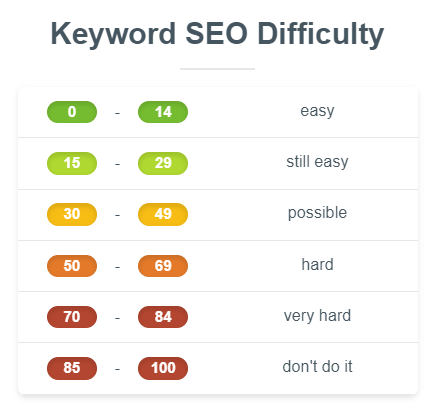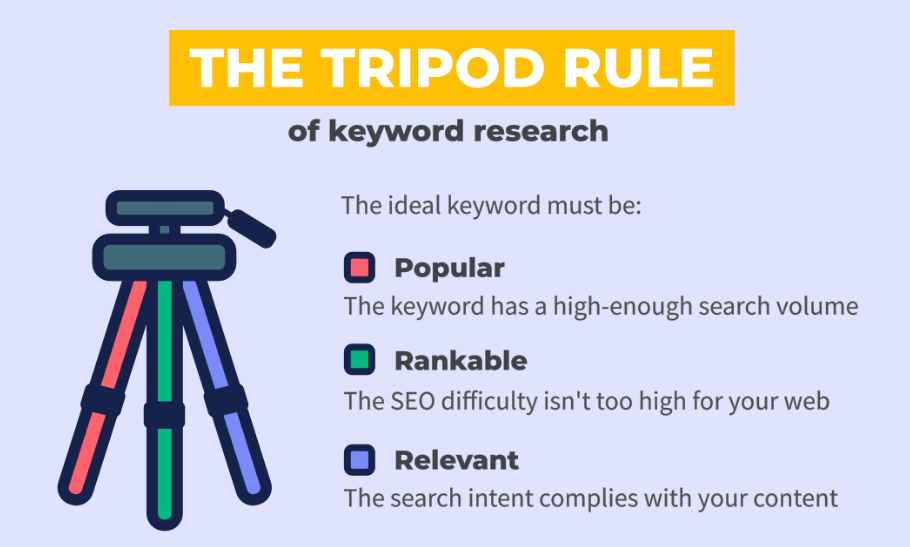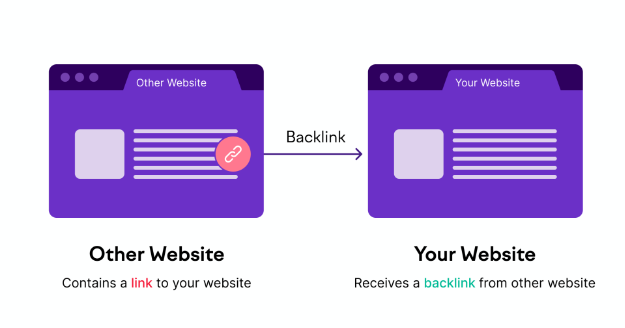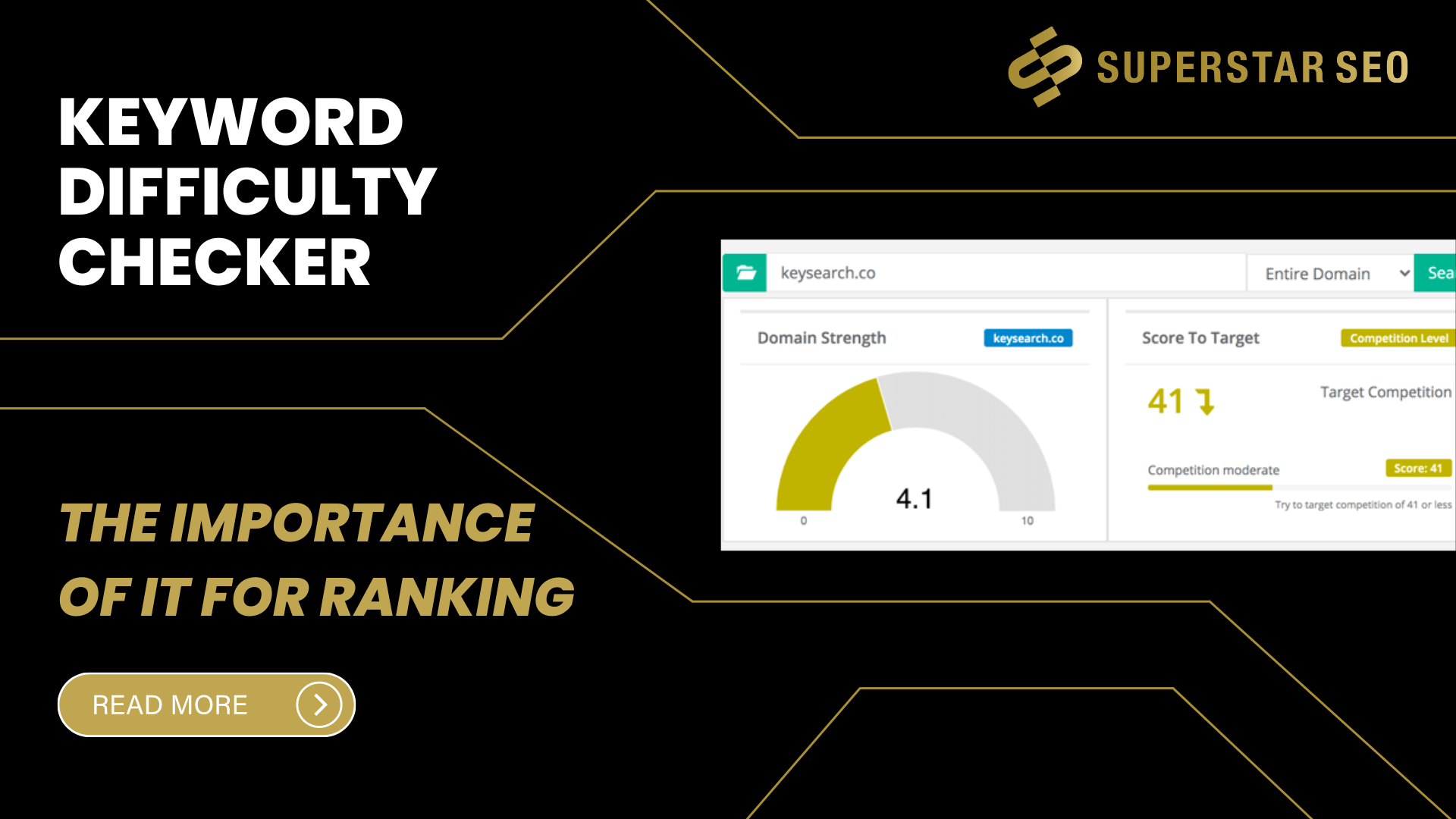The Importance of a Keyword Difficulty Checker for Ranking
Keyword difficulty is one of the most important factors to consider when choosing keywords for your website or content strategy.
It gives you an idea of how difficult it will be to rank well for certain keywords based on the number of other websites already ranking well. Calculating keyword difficulty involves using various tools that employ different formulas, but core factors such as content quality and alignment with user intent are universally important.
This article will explore in more detail why keyword difficulty is so important and outline what you should look for when deciding on a good difficulty keyword score.
What Is Keyword Difficulty and Search Volume in SEO?
When used in SEO, a keyword difficulty check is how difficult it is to rank on page one of the search engine results page (SERP).
It’s important to use this because if you’re trying to generate traffic with SEO, you want as much as possible to be targeted traffic.
You don’t want to do everything right from an SEO perspective: the page architecture, the backlinks, the URL, create great, etc., etc., and fail to rank on the first page of SERPs.
Is There a Good Keyword Difficulty to Target?
There isn’t an exact number, but there is a formula.
Knowing your competition, the search engines, and the goal will help you determine the difficulty level to work on.
This means that you first must know your site to know what a good keyword difficulty score is.
So, if you’re running a high-authority domain, you may have the potential to win more difficult keywords more easily.
In that case, targeting high-difficulty search terms might even be worthwhile.

Contrarily, deciding whether to target the most difficult search terms might not be clear-cut if you’re running a brand-new site.
In most cases, it might be a wiser strategy to avoid the most difficult keywords and target easier ones while you build up your authority over time. Considering the keyword search volume, which is the average number of monthly searches for a keyword, can also guide your strategy. Higher-volume keywords attract more competition but can drive more traffic to your website.
However, if you decide that the most challenging keywords are foundational to your business, targeting them is worth the extra effort, even if it may take longer to rank.
Why Is Keyword Difficulty Important for SEO?
One important function of keyword difficulty checkers is to analyze what your competition is doing with their SEO.
Some sites use ‘difficult’ keywords and phrases that will be hard to rank against if you don’t invest in good SEO.
They may also reveal up-and-coming topics in an industry or possible new entries into niche markets.
So, in a sense, it’s a super important part of the keyword research and SEO process.

Why?
Well, obviously, it helps you choose the best keywords for SEO.
Additionally, they can help you determine what your potential organic traffic could be over time by analyzing search engine results.
In other words, keyword difficulty can help you determine how realistic your SEO goals are to rank a new page.
You can use that knowledge to build your content plan and allocate the appropriate resources to support it.
How Hard Will It Be for You to Rank for a Particular Keyword on the Search Engine Results Page?
1. Content Quality Impacts Keyword Difficulty
First and foremost, keyword difficulty is what search engines use to gauge the quality of a site.
If you have high levels of difficult keywords on your site, then you should also have good content and domain authority.
So, answer these questions:
How hard will it be to write content of equal or better quality than the competing pages?
Compared to the competitors, is there any benefit you can provide readers? (visuals, knowledge, unique data, unique perspective, etc.)
Can you provide the same level of expertise as my competitors?
Does your content align with the user’s search intent?
These are subjective factors that contribute to the overall keyword difficulty in your specific case.
2. Competitors Impacts Keyword Difficulty
Looking at competing websites is one of the best ways to estimate the SEO keyword difficulty of ranking for a keyword.
Focus on the quality of their content and on-page SEO.
If your main competitors for a keyword are well-established and have high authority domains, it will be even harder to unseat them from the top spots.
The truth is that if you have a new domain, you will struggle to rank for competitive keywords.
After all, it takes time to build up the authority you need to conquer the SERPs — especially when your competitors are already established as authority in that industry.
One other key factor is the authority of your own website.
So, even if the competition for a keyword is relatively low and you write the most out-of-this-world piece of content, you probably won’t rank with your brand new site, which has zero backlinks.
3. Backlinks
While Google’s ranking factors have evolved over time, the presence and quality of backlinks are still essential considerations for SEO.
Quality backlinks are inbound links that come from authoritative sources.

And it’s these links that tell search engines that your content is likely to be trustworthy.
This ultimately helps to build your domain’s authority.
If you want new content to rank, you need to map out a link-building strategy to grow its authority over time.
And if in the near future you will have content that ranks, building and maintaining a solid backlink profile will help you stay on top.
Keyword Research and Difficulty
Keyword research is a crucial step in search engine optimization (SEO) that involves identifying and selecting the most relevant and high-traffic keywords for a website or content. At the heart of this process lies the keyword difficulty metric, which helps determine the level of competition for a particular keyword. Understanding keyword difficulty is essential because it allows you to gauge how challenging it will be to rank for specific terms, guiding your overall SEO strategy.
How to Conduct Keyword Research for Optimal Results
Conducting keyword research involves several steps to ensure you identify the best keywords for your content:
Brainstorming: Start by brainstorming a list of keywords related to your business, product, or service. Think about what terms your potential customers might use when searching for your offerings.
Keyword Research Tools: Utilize keyword research tools such as Google Keyword Planner, Ahrefs, or SEMrush to find relevant keywords and their search volume. These tools provide valuable insights into how often keywords are searched and their competitiveness.
Analyze Competitors: Examine your competitors’ websites to identify the keywords they are targeting. This can reveal opportunities to target similar or related keywords that you might have overlooked.
Long-Tail Keywords: Focus on long-tail keywords that are more specific and less competitive. These keywords often have lower search volumes but can attract highly targeted traffic.
Keyword Clustering: Group similar keywords together to identify patterns and themes. This helps in creating content that can rank for multiple related keywords, enhancing your chances of appearing in search results.
Using Keyword Difficulty Score to Inform Research
The keyword difficulty score is a metric that measures the level of competition for a particular keyword. It’s essential to use this score to inform your research and make strategic decisions about which keywords to target. Here’s how to leverage the keyword difficulty score effectively:
Identify Keywords with Low Difficulty Scores: Target keywords with low difficulty scores that have a high search volume. These keywords are easier to rank for and can drive significant traffic to your site.
Analyze Competitors: Look at your competitors’ websites to see which keywords they are targeting with low difficulty scores. This can help you find keywords that are both relevant and attainable.
Prioritize Keywords: Prioritize keywords based on their difficulty score, search volume, and relevance to your business. This ensures you focus your efforts on keywords that offer the best balance of competitiveness and potential traffic.
Create Content: Develop high-quality content that targets your selected keywords and provides value to your audience. Well-crafted content is more likely to rank well and attract organic traffic.
Assessing Keyword Difficulty
Assessing keyword difficulty involves analyzing various metrics to determine the level of competition for a particular keyword. Here are some tools and metrics to help you assess keyword difficulty:
Tools for Checking Keyword Difficulty
Ahrefs: Ahrefs provides a keyword difficulty score that measures the level of competition for a particular keyword. It also offers insights into the number of referring domains and the quality of backlinks needed to rank.
SEMrush: SEMrush offers a keyword difficulty score that evaluates the competitiveness of a keyword. It also provides data on search volume and the number of referring domains.
Moz: Moz’s keyword difficulty score helps you understand how hard it will be to rank for a keyword. It considers factors like domain authority and the quality of competing pages.
Google Keyword Planner: Google Keyword Planner provides a competition metric that indicates the level of competition for a keyword. While it’s primarily designed for paid search, it can still offer valuable insights for organic SEO.
By using these tools, you can obtain personalized keyword difficulty scores and make informed decisions about which keywords to target in your SEO strategy.
Conclusion
Keyword difficulty is an important factor when it comes to ranking.
It measures how difficult it is to rank for the given keyword on Google.
Knowing how difficult your keywords are will allow you to know how much time you should spend optimizing each one and which ones to prioritize in order to give yourself more chances at ranking well on SERPs.
So, take the time to understand how doable it is to rank for the keywords you want and find opportunities such as lower difficulty and higher-value keywords to get on the search engine page results.





